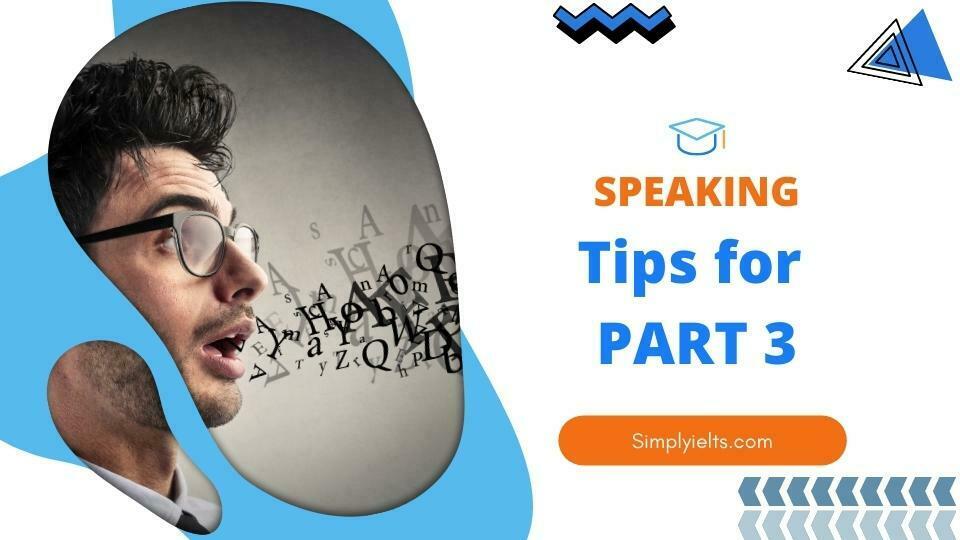Tips to crack IELTS Speaking Part 3

IELTS Speaking Part 3 is the last part of the Speaking test.
Here you will be asked a total of about six questions. The format of this part is similar to that of IELTS Speaking Part 1.
The examiner will ask you questions, and you must respond immediately. There is no extra time to prepare or think here.
Tips to crack IELTS Speaking Part 3
- Specific knowledge about any topic doesn’t matter.
- Your opinion matters on IELTS Speaking Part 3
- Offer a direct opinion with reasoning.
- You may contradict the tone of the question in your answers as long as you justify your opinion.
- Compare the options if offered in a question and give respective explanations.
Few observations on IELTS Speaking Part 3
The intention of IELTS Speaking Part 3
Most of the times, in part 3, you are asked questions related to the situation that you have already described in part 2.
For example, in part 2 if you have talked about the family trip to a tourist destination, chances are in this part as well you will be asked questions related to travelling or tourism. This is the main reason why many people call it a follow-up part.
However, in our view, it should be called a general opinion since you are asked your views on a matter that you may not know much about.
Tip 1: Specific knowledge about any topic doesn’t matter.
Continuing the same example where you talked about a family trip to a tourist destination, let’s say in part 3 you are asked about tourism. If you are asked, “What can locals do help tourists enjoy their visit?” chances are that you may not be confident about everything since most people don’t know much about tourism.
However, the IELTS speaking examiner is not much worried about your knowledge’s depth. Instead, he or she may expect just your opinion on the matter. So, you should concentrate on speaking about what things can locals to help tourists enjoy their visit according to you.
Tip 2: Your opinion matters on IELTS Speaking Part 3
Moreover, it is essential to note that recently it has been observed that a few examiners need not ask you follow-up questions on the topic in the second part. They may ask you questions on unrelated issues. Yet these questions will ask your point of view on matters with which you may not be familiar.
For instance, after talking about the family trip to a tourist destination, it is possible that the questions in the third part could be about politics.
Sample questions on IELTS Speaking Part 3
To understand, IELTS Speaking Part 3, we will take three sample questions to help you know how to tackle it.
- What would the world be like without computers?
- Should children be taught to use computers at school?
- Do you prefer using a computer for professional reasons or personal tasks?
Now, I am sure most of us don’t even consider these questions in daily life. So, it is understandable why many students find them difficult. Still, let’s analyse some wrong and some right answers to these questions.
Q1: What would the world be like without computers?
A wrong answer to Q1:
“Well, I have not really thought about it. So, I cannot answer it.”
Now the above answer is alright, but you must know that specific knowledge doesn’t matter. What matters is your opinion.
Another bad answer to Q1:
“Well, I cannot imagine my life without computers. They are the backbones of our modern society. They are the reasons why trains reach their destination on time. Computers are essential to communicate with the world.”
Now, it may seem like a decent answer. But ask yourself, has the person answered the question? No, not at all. You are supposed to paint a picture for the IELTS interviewer of the world where there are no computers. Now consider the following answer.
An excellent answer to Q1:
“A world without computers would not be great. Computers have single-handedly catapulted us into being an advanced civilisation. Without computers, most of what we do in a day would take days or weeks or even months to accomplish. For example, we could not have invented fast means of communication such as aeroplanes without computers.”
The above answer does an excellent job of painting a picture of the world without any computers. It tells us in a much better way what the world without a computer would look like.
However, to do so, the person offers a direct answer and explains it with reasoning and example.
Tip 3: Offer a direct opinion with reasoning.
Q2: Should children be taught to use computers at school?
For these types of questions, many students think that they must answer affirmatively. Many may manage an answer similar to that stated following.
An excellent answer to Q2:
“Given that computers are instrumental in shaping the future, it is my opinion that it should be mandatory for children to be taught computers in school. They may help students to adapt to the fast-changing world.”
However, it is not mandatory that you must answer in a positive tone. One could also offer a contrary opinion as long as the view is justified.
Tip 4: You may contradict the question’s tone in your answers as long as you justify your opinion.
Another right answer to Q2:
“I am not sure of the idea that we must teach computers to children. At such a tender age, children must learn to be one with nature. They must learn empathy that can be learnt only by spending maximum time with fellow humans and surroundings. If they are taught computers, I believe they may turn out to be emotionally cold individuals.”
Again, you may observe that your answer seems convincing when you offer your opinion and explain why you believe in it.
Now, let’s turn to the last question.
Q3: Do you prefer using a computer for professional reasons or personal tasks?
A wrong answer to Q3:
“I usually prefer using a computer for professional reasons. I send emails to my colleagues and communicate with them on video calls daily.”
This question clearly demands a comparison between using a computer for work and for personal purpose. So, you must offer it.
Tip 5: Compare the options and offer respective explanations.
An excellent answer to Q3:
“I find myself using a computer for my office to work more often. I keep in touch with my colleagues with the help of emails and video calls throughout the day. After working on that machine throughout the day, I don’t wish to spend even a second in front of it for my personal tasks.”
I hope you have realised how the above answer is complete as the opinion is backed by reasoning. Also, the two possible applications of the computer are compared well.
I am sure you understood how to answer questions on IELTS Speaking Part 3.





Responses